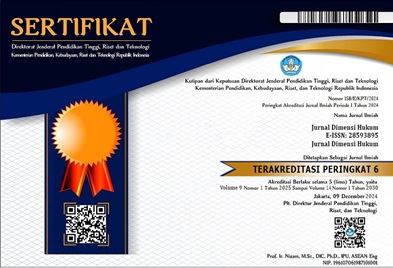OPTIMALISASI PERAN KEJAKSAAN DALAM PROSES PENYIDIKAN TINDAK PIDANA KORUPSI
Kata Kunci:
Kejaksaan, Penyidikan, Tindak Pidana Korupsi, Undang-Undang, OptimalisasiAbstrak
Optimalisasi Peran Kejaksaan dalam Memproses Penyidikan Tindak Pidana Korupsi, yang bertujuan untuk menganalisis dan mengevaluasi efektivitas peran kejaksaan dalam proses penyidikan tindak pidana korupsi berdasarkan kekuatan undang-undang. Metode penelitian yang digunakan adalah metode normatif, dengan pendekatan perundang-undangan (statute approach) dan pendekatan analisis konseptual (conceptual approach)Penelitian ini berfokus pada pengkajian hukum positif di Indonesia, khususnya Undang-Undang Nomor 16 Tahun 2004 tentang Kejaksaan Republik Indonesia dan Undang-Undang Nomor 31 Tahun 1999 junto Undang-Undang Nomor 20 Tahun 2001 tentang Pemberantasan Tindak Pidana Korupsi. Hasil penelitian menunjukkan bahwa kejaksaan memiliki posisi strategis sebagai salah satu aktor utama dalam pemberantasan korupsi, baik melalui kewenangan penyidikan maupun koordinasi dengan lembaga penegak hukum lainnya, seperti Kepolisian dan Komisi Pemberantasan Korupsi (KPK). Namun demikian, penelitian ini menemukan adanya kendala dalam pelaksanaan tugas kejaksaan, seperti tumpang tindih kewenangan, keterbatasan sumber daya manusia, serta pengaruh eksternal yang dapat menghambat independensi kejaksaan. Untuk mengatasi kendala tersebut, optimalisasi peran kejaksaan perlu dilakukan melalui penguatan kerangka hukum, peningkatan kompetensi penyidik, dan kolaborasi antarlembaga penegak hukum secara lebih efektif. Dengan demikian, penelitian ini diharapkan dapat memberikan kontribusi dalam pengembangan kebijakan hukum yang lebih responsif dan mendukung pemberantasan korupsi di Indonesia.
Optimizing the Role of the Prosecutor's Office in Processing Corruption Crime Investigations, which aims to analyze and evaluate the effectiveness of the role of the prosecutor's office in the process of investigating corruption crimes based on the power of the law. The research method used is the normative method, with a statute approach and a conceptual analysis approach. This study focuses on the study of positive law in Indonesia, especially Law Number 16 of 2004 concerning the Prosecutor's Office of the Republic of Indonesia and Law Number 31 of 1999 junto Law Number 20 of 2001 concerning the Eradication of Corruption. The results of the study indicate that the prosecutor's office has a strategic position as one of the main actors in eradicating corruption, both through investigative authority and coordination with other law enforcement agencies, such as the Police and the Corruption Eradication Commission (KPK). However, this study found obstacles in the implementation of the prosecutor's duties, such as overlapping authority, limited human resources, and external influences that can hinder the independence of the prosecutor's office. To overcome these obstacles, optimization of the role of the prosecutor's office needs to be carried out by strengthening the legal framework, increasing the competence of investigators, and collaborating more effectively between law enforcement agencies. Thus, this study is expected to contribute to the development of more responsive legal policies and support the eradication of corruption in Indonesia.





